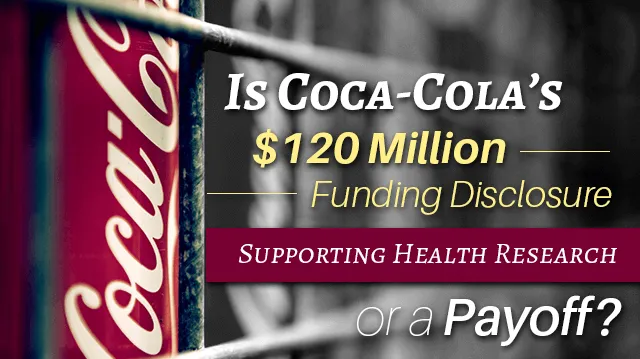In the past five years, Coca-Cola has spent nearly $120 million on health research and community programs in an effort to trim the current obesity epidemic. The National Institute of Health, university research groups, physicians, cancer and diabetes organizations, and recreation departments are among the recipients of grants and funding given by Coca-Cola over the past five years.
The list of its philanthropic efforts was disclosed this week after Muhtar Kent, Coca-Cola’s chief executive vowed transparency regarding the company’s support of obesity research. An article in The New York Times released last month, in which Coca-Cola was criticized for its downplay of the growing obesity problem, may have been the catalyst for the company’s unexpected candor.
Obesity is an increasing issue in America, with one-third of the population, 78.6 million adults, classified as obese, according to the Centers for Disease Control and Prevention (CDC). The CDC statistics regarding children is even more concerning: 17 percent of children between the ages of two and 19 in the United States are considered obese. This percentage equates to 12.7 million children. Obesity leads to many chronic diseases, including diabetes, cancer, inflammatory disease and heart disease, the nation’s number-one killer.
“Our engagement and financial support of these well-respected experts, institutions and organizations were made with the best of intentions — to inform our business, support our local communities and support solutions to the public health issues facing people across the United States and around the world,” Sandy Douglas, the president of Coca-Cola North America wrote in a statement. There was also note of the company’s emphasis on the “public good” in the statement as well. Public good? What about its products?
The long list of grants and funding, under the title, “Our Commitment to Transparency,” covers every donation that Coca-Cola has made since 2010. The five-year philanthropy campaign is commendable in many ways, and the organizations that have received the grants and funding are probably more than grateful. The list covers funding from 350 to 3.5 million dollars, which was given to the American Academy of Family Physicians.

It is challenging for many research groups to get the funding they need in order to continue studying the obesity epidemic. If Coca-Cola has its wallet open, why not hold out a hand? However, a conflict of interest arises when taking Coca-Cola’s “sugar money” since research organizations have an ethical responsibility to remain as neutral as possible.
“These organizations are forming partnerships with a company whose products are absolutely thought to be a major player in obesity and the spread of chronic, noncommunicable diseases,” Yoni Freedhoff, an obesity expert at the University of Ottawa stated in an interview with The New York Times. “Why in this day and age would a public health organization create even the possibility for there to be influence that might affect their ability to champion and promote public health?”
Freedhoff has a point, but if researchers stop accepting charity from Coca-Cola, where do they get the vital resources to continue their research? Funding from the government? As it continues its philanthropic efforts to fund the fight against obesity, Coca-Cola’s intentions may only be as pure as its products. These grants may be a legal way to pay off the national, state and private institutions that have openly denounced Coke products as anything even close to healthy in the not so distant past.
Is Coca-Cola issuing payoffs, or is it sincerely attempting to fund the fight against the American obesity problem? What do you think?
-Stephen Seifert
Stephen Seifert is a writer, professor, adventurer and a health & fitness guru. His flare for travel and outdoor adventure allows him to enjoy culture and traditions different than his own. A healthy diet, routine fitness and constant mental development is the cornerstone to Stephen’s life.
Sources:
http://www.coca-colacompany.com/transparency-search?noCache=true
http://www.coca-colacompany.com/transparency
http://www.cdc.gov/obesity/data/adult.html
http://www.cdc.gov/obesity/data/childhood.html
